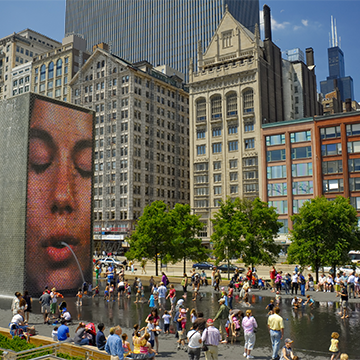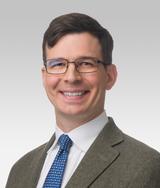Advanced Thoracic Surgery Fellowship
The Advanced Thoracic Surgery Fellowship at Northwestern University offers a unique 24-month program designed to provide in-depth, specialized training in lung transplantation and advanced surgical techniques for treating acute and chronic lung failure. As one of the leading lung transplant programs in the country, Northwestern performs over 100 transplants annually, giving fellows unparalleled exposure to a high volume of diverse and complex cases.
This comprehensive fellowship prepares surgeons for the full spectrum of lung transplant care, from pre-operative patient evaluation and donor selection to complex surgical procedures and long-term post-transplant management. Fellows also gain expertise in advanced respiratory support technologies, including extracorporeal membrane oxygenation (ECMO) and ex vivo lung perfusion (EVLP), which are integral to managing patients with severe respiratory failure. These skills, often beyond the scope of traditional general or thoracic surgery training, make our graduates highly sought after in the field.
The program places strong emphasis on research, offering fellows opportunities to engage in cutting-edge clinical and basic science investigations. Fellows are encouraged to participate in and lead research projects that contribute to the advancement of lung transplantation. By the end of the fellowship, each fellow is expected to publish at least one first-author manuscript in a peer-reviewed journal, showcasing their scholarly contributions during the fellowship.
At Northwestern, our fellows benefit from mentorship by internationally recognized experts in lung transplantation, thoracic surgery, and pulmonary medicine. Our didactic curriculum, including weekly conferences, lectures, and journal clubs, complements hands-on training, ensuring a well-rounded education. Additionally, fellows have opportunities to develop their leadership and teaching skills by working with residents and medical students.
Upon completion, our graduates are fully equipped to take on leadership roles in lung transplant programs, thoracic surgery departments, and academic centers. They leave the program with the confidence and expertise needed to manage the most complex cases and contribute to the continued evolution of lung transplantation and respiratory support technologies.
Program Highlights:
- Extensive hands-on experience with over 100 lung transplants performed annually.
- Advanced training in ECMO and ex vivo lung perfusion.
- Strong focus on research with dedicated time for clinical or basic science projects.
- Mentorship by leading experts in thoracic surgery and pulmonary medicine.
- Comprehensive didactic curriculum, including weekly lectures, conferences, and journal clubs.
- Preparation for leadership roles in academic and clinical settings.
The Lung Transplant Fellowship at Northwestern University is an unparalleled opportunity for surgeons looking to excel in lung transplantation and advanced thoracic care.
Clinical Experience
The 24-month Lung Transplant Fellowship program at Northwestern University provides an in-depth and specialized experience in the surgical and medical management of lung transplantation and advanced therapies for lung failure. The fellowship is designed to ensure comprehensive training in the selection and management of transplant candidates, donor and recipient surgery, post-operative care, and cutting-edge therapeutic techniques such as extracorporeal membrane oxygenation (ECMO) and ex vivo lung perfusion (EVLP).
With a growing caseload of over 100 lung transplants annually, the program offers a robust clinical experience that prepares fellows for independent practice upon completion. Additionally, a strong research component—including a dedicated three-month elective—focuses on fostering academic achievement, including publishing original research in peer-reviewed journals. Fellows will work closely with Northwestern’s accomplished faculty in thoracic surgery, pulmonary medicine, and related disciplines to refine their surgical, clinical, and research skills, ultimately emerging as leaders in the field of lung transplantation and advanced respiratory support.
1st Year Curriculum: Foundational Clinical Skills and Surgical Exposure
Goal: Develop core skills in lung transplantation, donor/recipient management, and exposure to related thoracic procedures.
- Introduction and Orientation (1 Month)
- Program overview, expectations, and team integration.
- Introduction to lung transplant service, ECMO team, and thoracic surgery department.
- Donor and Recipient Surgery (Months 2-6)
- Focus on donor selection and management.
- Assist and perform recipient surgeries under close supervision.
- Exposure to ex vivo lung perfusion (EVLP) techniques.
- Multidisciplinary team rounds focusing on post-operative care.
- ECMO and Advanced Respiratory Support (Months 7-9)
- Clinical rotations in ECMO management, including patient selection, cannulation techniques, and troubleshooting ECMO complications.
- Collaborate with ICU teams on the management of patients on ECMO.
- Learn principles of transitioning patients from ECMO to lung transplantation.
- Thoracic Surgery Rotations (Months 10-12)
- Exposure to a broad range of thoracic procedures, including lung resections, pleural surgeries, and minimally invasive techniques.
- Assist in surgeries to develop core thoracic surgical skills.
- Multidisciplinary case reviews and participation in tumor boards.
- Didactic Learning (Throughout Year 1)
- Weekly transplant meetings, grand rounds, and morbidity & mortality conferences.
- Journal clubs with a focus on recent advancements in lung transplantation, ECMO, and thoracic surgery.
- Begin work on a research project with an emphasis on data collection and protocol development.
2nd Year Curriculum: Advanced Surgical Mastery and Research Focus
Goal: Transition to higher levels of surgical independence, leadership in complex cases, and completion of research.
- Advanced Donor and Recipient Surgery (Months 1-4)
- Perform donor organ procurement independently, under supervision.
- Lead recipient surgeries with limited supervision, focusing on complex cases.
- Expanded role in EVLP, including donor organ reconditioning and selection.
- Advanced ECMO and Respiratory Support (Months 5-6)
- Serve as a lead fellow in ECMO management, assisting in weaning and troubleshooting.
- Participate in ECMO training for residents and medical students.
- Develop protocols for patient management on ECMO for lung failure and peri-transplant care.
- Research Elective (Months 7-9)
- Dedicated time for clinical or basic science research in thoracic surgery or pulmonary medicine.
- Completion and submission of a first-author manuscript based on the fellow’s work.
- Participate in national conferences to present research findings.
- Leadership in Thoracic Surgery (Months 10-12)
- Serve as the chief fellow, overseeing junior fellows and residents.
- Lead multidisciplinary team discussions and decision-making for complex cases.
- Perform higher-volume thoracic surgeries, including complicated resections and robotic procedures.
- Final Preparations for Independent Practice (Months 11-12)
- Mock oral boards and in-depth case reviews to prepare for independent practice.
- Attend professional development workshops focusing on transitioning to a career in academic or clinical transplant surgery.
- Didactic Learning (Throughout Year 2)
- Continue participation in conferences, grand rounds, and educational activities.
- Lead journal clubs and present advanced topics in lung transplantation, thoracic surgery, and respiratory support.
- Complete the research project and submit manuscripts for publication.
This carefully structured curriculum ensures that fellows transition from foundational skills to advanced surgical competence, research accomplishment, and leadership in lung transplantation. By the end of the fellowship, they will be equipped to contribute significantly to the field of lung transplantation, manage complex cases, and drive innovations in respiratory failure management.
Requirements & Eligibility
Completion of a five-year, ACGME-approved general surgery training program or equivalent before the anticipated fellowship start date is required for all applicants. Our application review committee considers the entire application. Therefore, we do not have any minimum score requirements.
International Medical Graduates
No previous U.S. clinical experience is required to apply to our program. We do not have a minimum/maximum number of years from medical school graduation date requirement. The preferred visa for training at the McGaw Medical Center of Northwestern University is the J-1 visa sponsored through the ECFMG for residency/fellowship training. Applicants should be ECFMG-certified by the application deadline (Nov. 1).
Application Process
Applications must be submitted by Nov. 1 to the Education Coordinator, Rita Guzman (rita.guzman@nm.org).
A complete application includes the following:
- Three letters of recommendation
- Personal statement
- USMLE transcript
- CV
- Certificate of Completion from U.S. or board-approved residency and/or fellowship program
- Visa documents (if applicable)
- Medical school transcript
- Medical school performance evaluation (dean's letter) *optional
- ECFMG certificate (if applicable)
- ABSITE transcripts
Personal interviews are by invitation only and are required for acceptance to our program. Those we wish to invite to interview will be notified via email.
Why Northwestern?
 Housestaff training through McGaw Medical Center of Northwestern University provides diverse and challenging clinical experiences and world-class education located in the heart of the beautiful city of Chicago.
Housestaff training through McGaw Medical Center of Northwestern University provides diverse and challenging clinical experiences and world-class education located in the heart of the beautiful city of Chicago.
Watch Our Videos
Contact Us
Rita Guzman
Education Coordinator
312-926-1574
Physician-Scientist Training & Resources
We offer a wide range of resources, mentorship opportunities and formal training programs to help our residents and fellows excel as physician-scientists. Explore all of the resources and hear from housestaff who are making research a major part of their career development plans.
